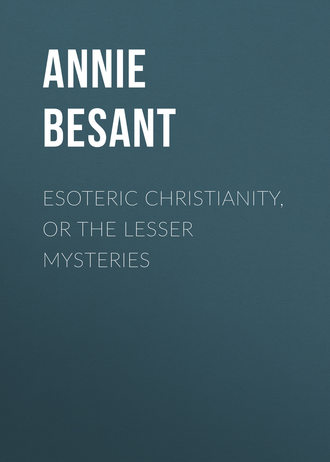 полная версия
полная версияEsoteric Christianity, or The Lesser Mysteries
Again, Jesus tells even His apostles: "I have yet many things to say to you, but ye cannot bear them now."42 Some of them were probably said after His death, when He was seen of His disciples, "speaking of the things pertaining to the kingdom of God."43 None of these have been publicly recorded, but who can believe that they were neglected or forgotten, and were not handed down as a priceless possession? There was a tradition in the Church that He visited His apostles for a considerable period after His death, for the sake of giving them instruction – a fact that will be referred to later – and in the famous Gnostic treatise, the Pistis Sophia, we read: "It came to pass, when Jesus had risen from the dead, that He passed eleven years speaking with His disciples and instructing them."44 Then there is the phrase, which many would fain soften and explain away: "Give not that which is holy to the dogs, neither cast ye your pearls before swine"45 – a precept which is of general application indeed, but was considered by the early Church to refer to the secret teachings. It should be remembered that the words had not the same harshness of sound in the ancient days as they have now; for the words "dogs" – like "the vulgar," "the profane" – was applied by those within a certain circle to all who were outside its pale, whether by a society or association, or by a nation – as by the Jews to all Gentiles.46 It was sometimes used to designate those who were outside the circle of Initiates, and we find it employed in that sense in the early Church; those who, not having been initiated into the Mysteries, were regarded as being outside "the kingdom of God," or "the spiritual Israel," had this name applied to them.
There were several names, exclusive of the term "The Mystery," or "The Mysteries," used to designate the sacred circle of the Initiates or connected with Initiation: "The Kingdom," "The Kingdom of God," "The Kingdom of Heaven," "The Narrow Path," "The Strait Gate," "The Perfect," "The Saved," "Life Eternal," "Life," "The Second Birth," "A Little One," "A Little Child." The meaning is made plain by the use of these words in early Christian writings, and in some cases even outside the Christian pale. Thus the term, "The Perfect," was used by the Essenes, who had three orders in their communities: the Neophytes, the Brethren, and the Perfect – the latter being Initiates; and it is employed generally in that sense in old writings. "The Little Child" was the ordinary name for a candidate just initiated, i. e., who had just taken his "second birth."
When we know this use, many obscure and otherwise harsh passages become intelligible. "Then said one unto Him: Lord, are there few that be saved? And He said unto them: Strive to enter in at the strait gate; for many, I say unto you, will seek to enter in and shall not be able."47 If this be applied in the ordinary Protestant way to salvation from everlasting hell-fire, the statement becomes incredible, shocking. No Saviour of the world can be supposed to assert that many will seek to avoid hell and enter heaven, but will not be able to do so. But as applied to the narrow gateway of Initiation and to salvation from rebirth, it is perfectly true and natural. So again: "Enter ye in at the strait gate; for wide is the gate and broad is the way that leadeth to destruction, and many there be which go in thereat; because strait is the gate and narrow is the way which leadeth unto life; and few there be that find it."48 The warning which immediately follows against the false prophets, the teachers of the dark Mysteries, is most apposite in this connection. No student can miss the familiar ring of these words used in this same sense in other writings. The "ancient narrow way" is familiar to all; the path "difficult to tread as the sharp edge of a razor,"49 already mentioned; the going "from death to death" of those who follow the flower-strewn path of desires, who do not know God; for those men only become immortal and escape from the wide mouth of death, from ever repeated destruction, who have quitted all desires.50 The allusion to death is, of course, to the repeated births of the soul into gross material existence, regarded always as "death" compared to the "life" of the higher and subtler worlds.
This "Strait Gate" was the gateway of Initiation, and through it a candidate entered "The Kingdom." And it ever has been, and must be, true that only a few can enter that gateway, though myriads – an exceedingly "great multitude, which no man could number,"51 not a few – enter into the happiness of the heaven-world. So also spoke another great Teacher, nearly three thousand years earlier: "Among thousands of men scarce one striveth for perfection; of the successful strivers scarce one knoweth me in essence."52 For the Initiates are few in each generation, the flower of humanity; but no gloomy sentence of everlasting woe is pronounced in this statement on the vast majority of the human race. The saved are, as Proclus taught,53 those who escape from the circle of generation, within which humanity is bound.
In this connection we may recall the story of the young man who came to Jesus, and, addressing Him as "Good Master," asked how he might win eternal life – the well-recognised liberation from rebirth by knowledge of God.54 His first answer was the regular exoteric precept: "Keep the commandments." But when the young man answered: "All these things have I kept from my youth up;" then, to that conscience free from all knowledge of transgression, came the answer of the true Teacher: "If thou wilt be perfect, go and sell that thou hast, and give to the poor, and thou shalt have treasure in heaven; and come and follow me." "If thou wilt be perfect," be a member of the Kingdom, poverty and obedience must be embraced. And then to His own disciples Jesus explains that a rich man can hardly enter the Kingdom of Heaven, such entrance being more difficult than for a camel to pass through the eye of a needle; with men such entrance could not be, with God all things were possible.55 Only God in man can pass that barrier.
This text has been variously explained away, it being obviously impossible to take it in its surface meaning, that a rich man cannot enter a post-mortem state of happiness. Into that state the rich man may enter as well as the poor, and the universal practice of Christians shows that they do not for one moment believe that riches imperil their happiness after death. But if the real meaning of the Kingdom of Heaven be taken, we have the expression of a simple and direct fact. For that knowledge of God which is Eternal Life56 cannot be gained till everything earthly is surrendered, cannot be learned until everything has been sacrificed. The man must give up not only earthly wealth, which henceforth may only pass through his hands as steward, but he must give up his inner wealth as well, so far as he holds it as his own against the world; until he is stripped naked he cannot pass the narrow gateway. Such has ever been a condition of Initiation, and "poverty, obedience, chastity," has been the vow of the candidate.
The "second birth" is another well-recognised term for Initiation; even now in India the higher castes are called "twice-born," and the ceremony that makes them twice-born is a ceremony of Initiation – mere husk truly, in these modern days, but the "pattern of things in the heavens."57 When Jesus is speaking to Nicodemus, He states that "Except a man be born again, he cannot see the kingdom of God," and this birth is spoken of as that "of water and the Spirit;"58 this is the first Initiation; a later one is that of "the Holy Ghost and fire,"59 the baptism of the Initiate in his manhood, as the first is that of birth, which welcomes him as "the Little Child" entering the Kingdom.60 How thoroughly this imagery was familiar among the mystic of the Jews is shown by the surprise evinced by Jesus when Nicodemus stumbled over His mystic phraseology: "Art thou a master of Israel, and knowest not these things?"61
Another precept of Jesus which remains as "a hard saying" to his followers is: "Be ye therefore perfect, even as your Father which is in heaven is perfect."62 The ordinary Christian knows that he cannot possibly obey this command; full of ordinary human frailties and weaknesses, how can he become perfect as God is perfect? Seeing the impossibility of the achievement set before him, he quietly puts it aside, and thinks no more about it. But seen as the crowning effort of many lives of steady improvement, as the triumph of the God within us over the lower nature, it comes within calculable distance, and we recall the words of Porphyry, how the man who achieves "the paradigmatic virtues is the Father of the Gods,"63 and that in the Mysteries these virtues were acquired.
S. Paul follows in the footsteps of his Master, and speaks in exactly the same sense, but, as might be expected from his organising work in the Church, with greater explicitness and clearness. The student should read with attention chapters ii. and iii., and verse 1 of chapter iv. of the First Epistle to the Corinthians, remembering, as he reads, that the words are addressed to baptised and communicant members of the Church, full members from the modern standpoint, although described as babes and carnal by the Apostle. They were not catechumens or neophytes, but men and women who were in complete possession of all the privileges and responsibilities of Church membership, recognised by the Apostle as being separate from the world, and expected not to behave as men of the world. They were, in fact, in possession of all that the modern Church gives to its members. Let us summarise the Apostle's words:
"I came to you bearing the divine testimony, not alluring you with human wisdom but with the power of the Spirit. Truly 'we speak wisdom among them that are perfect,' but it is no human wisdom. 'We speak the wisdom of God in a mystery, even the hidden wisdom, which God ordained before the world' began, and which none even of the princes of this world know. The things of that wisdom are beyond men's thinking, 'but God hath revealed them unto us by his Spirit … the deep things of God,' 'which the Holy Ghost teacheth.'64 These are spiritual things, to be discerned only by the spiritual man, in whom is the mind of Christ. 'And I, brethren, could not speak unto you as unto spiritual, but as unto carnal, even as unto babes in Christ… Ye were not able to bear it, neither yet now are ye able. For ye are yet carnal.' 'As a wise master-builder65 I have laid the foundation,' and 'ye are the temple of God, and the Spirit of God dwelleth in you.' 'Let a man so account of us, as of the ministers of Christ, and stewards of the Mysteries of God.'"
Can any one read this passage – and all that has been done in the summary is to bring out the salient points – without recognising the fact that the Apostle possessed a divine wisdom given in the Mysteries, that his Corinthian followers were not yet able to receive? And note the recurring technical terms: the "wisdom," the "wisdom of God in a mystery," the "hidden wisdom," known only to the "spiritual" man, spoken of only among the "perfect," wisdom from which the non-"spiritual," the "babes in Christ," the "carnal," were excluded, known to the "wise master-builder," the "steward of the Mysteries of God."
Again and again he refers to these Mysteries. Writing to the Ephesian Christians he says that "by revelation," by the unveiling, had been "made known unto me the Mystery," and hence his "knowledge in the Mystery of Christ"; all might know of the "fellowship of the Mystery."66 Of this Mystery, he repeated to the Colossians, he was "made a minister," "the Mystery which hath been hid from ages and from generations, but now is made manifest to His saints"; not to the world, nor even to Christians, but only to the Holy Ones. To them was unveiled "the glory of this Mystery"; and what was it? "Christ in you" – a significant phrase, which we shall see, in a moment, belonged to the life of the Initiate; thus ultimately must every man learn the wisdom, and become "perfect in Christ Jesus."67 These Colossians he bids pray "that God would open to us a door of utterance, to speak the mystery of Christ,"68 a passage to which S. Clement refers as one in which the apostle "clearly reveals that knowledge belongs not to all."69 So also he writes to his loved Timothy, bidding him select his deacons from those who hold "the Mystery of the faith in a pure conscience," that great "Mystery of Godliness," that he had learned,70 knowledge of which was necessary for the teachers of the Church.
Now S. Timothy holds an important position, as representing the next generation of Christian teachers. He was a pupil of S. Paul, and was appointed by him to guide and rule a portion of the Church. He had been, we learn, initiated into the Mysteries by S. Paul himself, and reference is made to this, the technical phrases once more serving as a clue. "This charge I commit unto thee, son Timothy, according to the prophecies which went before on thee,"71 the solemn benediction of the Initiator, who admitted the candidate; but not alone was the Initiator present: "Neglect not the gift that is in thee, which was given thee by prophecy, by the laying on of the hands of the Presbytery,"72 of the Elder Brothers. And he reminds him to lay hold of that "eternal life, whereunto thou art also called, and hast professed a good profession before many witnesses"73– the vow of the new Initiate, pledged in the presence of the Elder Brothers, and of the assembly of Initiates. The knowledge then given was the sacred charge of which S. Paul cries out so forcibly: "O Timothy, keep that which is committed to thy trust"74– not the knowledge commonly possessed by Christians, as to which no special obligation lay upon S. Timothy, but the sacred deposit committed to his trust as an Initiate, and essential to the welfare of the Church. S. Paul later recurs again to this, laying stress on the supreme importance of the matter in a way that would be exaggerated had the knowledge been the common property of Christian men: "Hold fast the form of sound words which thou hast heard of me… That good thing which was committed unto thee, keep by the Holy Ghost which dwelleth in us"75– as serious an adjuration as human lips could frame. Further, it was his duty to provide for the due transmission of this sacred deposit, that it might be handed on to the future, and the Church might never be left without teachers: "The things that thou hast heard of me among many witnesses" – the sacred oral teachings given in the assembly of Initiates, who bore witness to the accuracy of the transmission – "the same commit thou to faithful men, who shall be able to teach others also."76
The knowledge – or, if the phrase be preferred, the supposition – that the Church possessed these hidden teachings throws a flood of light on the scattered remarks made by S. Paul about himself, and when they are gathered together, we have an outline of the evolution of the Initiate. S. Paul asserts that though he was already among the perfect, the initiated – for he says: "Let us, therefore, as many as be perfect, be thus minded" – he had not yet "attained," was indeed not yet wholly "perfect," for he had not yet won Christ, he had not yet reached the "high calling of God in Christ," "the power of His resurrection, and the fellowship of His sufferings, being made conformable unto His death;" and he was striving, he says, "if by any means I might attain unto the resurrection of the dead."77 For this was the Initiation that liberated, that made the Initiate the Perfect Master, the Risen Christ, freeing Him finally from the "dead," from the humanity within the circle of generation, from the bonds that fettered the soul to gross matter. Here again we have a number of technical terms, and even the surface reader should realise that the "resurrection of the dead" here spoken of cannot be the ordinary resurrection of the modern Christian, supposed to be inevitable for all men, and therefore obviously not requiring any special struggle on the part of any one to attain to it. In fact the very word "attain" would be out of place in referring to a universal and inevitable human experience. S. Paul could not avoid that resurrection, according to the modern Christian view. What then was the resurrection to attain which he was making such strenuous efforts? Once more the only answer comes from the Mysteries. In them the Initiate approaching the Initiation that liberated from the cycle of rebirth, the circle of generation, was called "the suffering Christ;" he shared the sufferings of the Saviour of the world, was crucified mystically, "made conformable to His death," and then attained the resurrection, the fellowship of the glorified Christ, and, after, that death had over him no power.78 This was "the prize" towards which the great Apostle was pressing, and he urged "as many as be perfect," not the ordinary believer, thus also to strive. Let them not be content with what they had gained, but still press onwards.
This resemblance of the Initiate to the Christ is, indeed, the very groundwork of the Greater Mysteries, as we shall see more in detail when we study "The Mystical Christ." The Initiate was no longer to look on Christ as outside himself: "Though we have known Christ after the flesh, yet now henceforth know we Him no more."79
The ordinary believer had "put on Christ;" "as many of you as have been baptised into Christ have put on Christ."80 Then they were the "babes in Christ" to whom reference has already been made, and Christ was the Saviour to whom they looked for help, knowing Him "after the flesh." But when they had conquered the lower nature and were no longer "carnal," then they were to enter on a higher path, and were themselves to become Christ. This which he himself had already reached, was the longing of the Apostle for his followers: "My little children, of whom I travail in birth again until Christ be formed in you."81 Already he was their spiritual father, having "begotten you through the gospel."82 But now "again" he was as a parent, as their mother to bring them to the second birth. Then the infant Christ, the Holy Child, was born in the soul, "the hidden man of the heart;"83 the Initiate thus became that "Little Child"; henceforth he was to live out in his own person the life of the Christ, until he became the "perfect man," growing "unto the measure of the stature of the fulness of Christ."84 Then he, as S. Paul was doing, filled up the sufferings of Christ in his own flesh,85 and always bore "about in the body the dying of the Lord Jesus,"86 so that he could truly say: "I am crucified with Christ: nevertheless I live; yet not I, but Christ liveth in me."87 Thus was the Apostle himself suffering; thus he describes himself. And when the struggle is over, how different is the calm tone of triumph from the strained effort of the earlier years: "I am now ready to be offered, and the time of my departure is at hand. I have fought a good fight, I have finished my course, I have kept the faith; henceforth there is laid up for me a crown of righteousness."88 This was the crown given to "him that overcometh," of whom it is said by the ascended Christ: "I will make him a pillar in the temple of my God; and he shall go no more out."89 For after the "Resurrection" the Initiate has become the Perfect Man, the Master, and He goes out no more from the Temple, but from it serves and guides the worlds.
It may be well to point out, ere closing this chapter, that S. Paul himself sanctions the use of the theoretical mystic teaching in explaining the historical events recorded in the Scriptures. The history therein written is not regarded by him as a mere record of facts, which occurred on the physical plane. A true mystic, he saw in the physical events the shadows of the universal truths ever unfolding in higher and inner worlds, and knew that the events selected for preservation in occult writings were such as were typical, the explanation of which would subserve human instruction. Thus he takes the story of Abraham, Sarai, Hagar, Ishmael, and Isaac, and saying, "which things are an allegory," he proceeds to give the mystical interpretation.90 Referring to the escape of the Israelites from Egypt, he speaks of the Red Sea as a baptism, of the manna and the water as spiritual meat and spiritual drink, of the rock from which the water flowed as Christ.91 He sees the great mystery of the union of Christ and His Church in the human relation of husband and wife, and speaks of Christians as the flesh and the bones of the body of Christ.92 The writer of the Epistle to the Hebrews allegorises the whole Jewish system of worship. In the Temple he sees a pattern of the heavenly Temple, in the High Priest he sees Christ, in the sacrifices the offering of the spotless Son; the priests of the Temple are but "the example and shadow of heavenly things," of the heavenly priesthood serving in "the true tabernacle." A most elaborate allegory is thus worked out in chapters iii. – x., and the writer alleges that the Holy Ghost thus signified the deeper meaning; all was "a figure for the time."
In this view of the sacred writings, it is not alleged that the events recorded did not take place, but only that their physical happening was a matter of minor importance. And such explanation is the unveiling of the Lesser Mysteries, the mystic teaching which is permitted to be given to the world. It is not, as many think, a mere play of the imagination, but is the outcome of a true intuition, seeing the patterns in the heavens, and not only the shadows cast by them on the screen of earthly time.
Chapter III.
THE HIDDEN SIDE OF CHRISTIANITY(concluded)
(b) The Testimony of the ChurchWhile it may be that some would be willing to admit the possession by the Apostles and their immediate successors of a deeper knowledge of spiritual things than was current among the masses of the believers around them, few will probably be willing to take the next step, and, leaving that charmed circle, accept as the depository of their sacred learning the Mysteries of the Early Church. Yet we have S. Paul providing for the transmission of the unwritten teaching, himself initiating S. Timothy, and instructing S. Timothy to initiate others in his turn, who should again hand it on to yet others. We thus see the provision of four successive generations of teachers, spoken of in the Scriptures themselves, and these would far more than overlap the writers of the Early Church, who bear witness to the existence of the Mysteries. For among these are pupils of the Apostles themselves, though the most definite statements belong to those removed from the Apostles by one intermediate teacher. Now, as soon as we begin to study the writings of the Early Church, we are met by the facts that there are allusions which are only intelligible by the existence of the Mysteries, and then statements that the Mysteries are existing. This might, of course, have been expected, seeing the point at which the New Testament leaves the matter, but it is satisfactory to find the facts answer to the expectation.
The first witnesses are those called the Apostolic Fathers, the disciples of the Apostles; but very little of their writings, and that disputed, remains. Not being written controversially, the statements are not as categorical as those of the later writers. Their letters are for the encouragement of the believers. Polycarp, Bishop of Smyrna, and fellow-disciple with Ignatius of S. John,93 expresses a hope that his correspondents are "well versed in the sacred Scriptures and that nothing is hid from you; but to me this privilege is not yet granted"94 – writing, apparently, before reaching full Initiation. Barnabas speaks of communicating "some portion of what I have myself received,"95 and after expounding the Law mystically, declares that "we then, rightly understanding His commandments, explain them as the Lord intended."96 Ignatius, Bishop of Antioch, a disciple of S. John,97 speaks of himself as "not yet perfect in Jesus Christ. For I now begin to be a disciple, and I speak to you as my fellow-disciples,"98 and he speaks of them as "initiated into the mysteries of the Gospel with Paul, the holy, the martyred."99 Again he says: "Might I not write to you things more full of mystery? But I fear to do so, lest I should inflict injury on you who are but babes. Pardon me in this respect, lest, as not being able to receive their weighty import, ye should be strangled by them. For even I, though I am bound [for Christ] and am able to understand heavenly things, the angelic orders, and the different sorts of angels and hosts, the distinction between powers and dominions, and the diversities between thrones and authorities, the mightiness of the æons, and the pre-eminence of the cherubim and seraphim, the sublimity of the Spirit, the kingdom of the Lord, and above all the incomparable majesty of Almighty God – though I am acquainted with these things, yet am I not therefore by any means perfect, nor am I such a disciple as Paul or Peter."100 This passage is interesting, as indicating that the organisation of the celestial hierarchies was one of the subjects in which instruction was given in the Mysteries. Again he speaks of the High Priest, the Hierophant, "to whom the holy of holies has been committed, and who alone has been entrusted with the secrets of God."101






